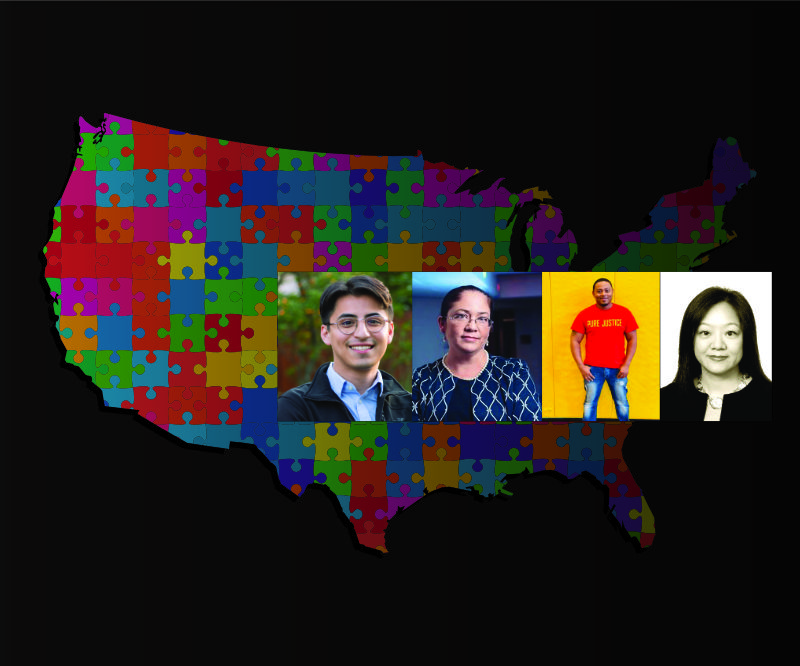Between the Lines – Redistricting Impacts Communities
(L-R) Panelists include Miguel Rivera, Redistricting Outreach Fellow, Texas Civil Rights Project; Nina Perales, Vice President of Litigation, Mexican American Legal Defense & Education Fund; Roshawn Evans, Co-founder, Pure Justice; Debbie Chen, Attorney, OCA-Greater Houston; (Not Pictured) Casandra Martinez, Gen-Z activist, Mi Familia Vota; (Not Pictured) Myrtala Tristan, Lakewood Resident
TL; DR
The one message everyone is resonating these days: your vote counts! You need to be counted! It all counts! Notice the one word in all these statements: “count.” The count determines who gets seats and federal funding. This funding is generally used in public welfare programs, the education system, and our roads. The count also provides the government with data to create future social programs, policies, and wise decisions for its people.
In a briefing focusing on redistricting in Harris County, Texas, the panelists had only one resonating message: “Your voice counts, and it is being heard.” Panelists included Nina Perales, Vice President of Litigation, Mexican American Legal Defense & Education Fund; Debbie Chen, Attorney, OCA-Greater Houston; Roshawn Evans, Co-founder, Pure Justice; Miguel Rivera, Redistricting Outreach Fellow, Texas Civil Rights Project, Casandra Martinez, Gen-Z activist, Mi Familia Vota. We also had a first-person account of Hurricane Harvey from a Lakewood Resident, Myrtala Tristan.
District lines get drawn in Harris County will determine whether voters can elect leaders who represent their interests. The briefing explores the impact of redistricting on
communities traditionally excluded from having a political voice. The briefing touches on a first-hand account of Hurricane Harvey and its impact on communities. Following, a brief definition of redistricting and its general impact on communities. Then there was an AAPI take on redistricting and a call-to-action for making community voices heard. Lastly, a Gen-Z activist, and an outreach fellow, both highlight the importance of outreach in getting the message properly communicated to communities.
Hurricane Harvey
Myrtala Tristan recounts the events during Hurricane Harvey. Streets turning into rivers, homes becoming furniture floats, walking in dirty water, and having very little assistance from the Trump administration. Tristan recounts leaving her house behind and carrying essentials not knowing what would happen next. Navigating through dirty waters and dealing with a truck full of distraught people without food or water, Tristan felt that the government’s handling of the situation was “very unfair.”
What is Redistricting
“Redistricting is about drawing lines on a map to represent who is going to vote for certain elected officials.” Nina Perales gives a thorough breakdown of what Redistricting is. “It is a very political act to create groups of voters, so it is very important to get involved.” She explains that redistricting essentially groups neighborhoods and communities into districts redrawn every decade based on the US Census. Many government agencies are involved – school districts, city councils, state chambers, you get the point.
Roshawn Evans explains that drawing these maps are hard. We need to participate and get counted properly so that the lines are drawn for more equitable communities.
Impact of Redistricting
On paper, this sounds good, however, people with power have been able to influence the rearrangement of communities for their own benefit. For example, many Latinos and minority groups are grouped in separate districts giving them less access to government resources – funding.
This was illustrated by Debbie Chen’s description of diverse neighborhoods in Houston. While some have green spaces, well-developed residential units, and paved roads, other neighborhoods contain exposed water lines and roads teeming with potholes.
The Gen-Z and South Asian Take
Both Miguel Rivera and Casandara Martinez point out the disconnect between immigrants and the importance of their voice and count. Rivera and Martinez share that the current attitude towards political actions is frivolous and unnecessary.
As seen in immigrant communities, especially the South Asian communities, there is a moderate disconnect between the first-generation immigrants’ relationship with United States politics when compared to their American-born younger counterparts. The South Asian parents consider themselves apart from the United States political system and are indifferent about their voice in the United States. On the contrary, South Asians born, brought up, and educated in the U.S. consider themselves active participants of the United States political system with contrasting ideologies from their parents.
Redistricting and voting work in unison. To the immigrants who think their participation doesn’t impact their future generations, here is a reality check. It is important to get counted as the count defines the districts we live in, the funding we get, and the resources we receive from the government. The count also measures how much power a district gets for proper representation in the US Government. That proper representation is only possible with active participation – voting, and be counted!


